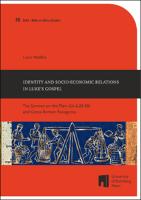Identity and Socio-Economic Relations in Luke’s Gospel
The Sermon on the Plain (Lk 6:20-49) and Greco-Roman Panegyrics
| dc.contributor.author | Ndekha, Louis | |
| dc.date.accessioned | 2024-03-04T17:12:15Z | |
| dc.date.available | 2024-03-04T17:12:15Z | |
| dc.date.issued | 2023 | |
| dc.identifier | ONIX_20240304_9783863099510_14 | |
| dc.identifier | OCN: 1425376924 | |
| dc.identifier.uri | https://library.oapen.org/handle/20.500.12657/88149 | |
| dc.description.abstract | The book's central argument is that the best way to interpret the Sermon on the Plain in Luke 6 is to read it as a Greco-Roman panegyric, whose function was the integration of new members and the inculcation of commonly held values. The Sermon's makarisms and woes and their juxtaposition of poverty and richness, and exhortation are Luke's attempt to construct a new socio-economic identity of Christ-followers by supplanting the values of the dominant culture with a new set of values adopted from the status of destitution for both the rich and the poor. This results in their common dependence on the Lord for their daily provisions. Such reliance on the Lord allows for the koinonia between the rich and the poor among the first-century Christ-followers. This socio-economic motif is replicated throughout the Third Gospel and typifies Luke's concept of salvation as a holistic one. | |
| dc.language | English | |
| dc.relation.ispartofseries | Bible in Africa studies | |
| dc.subject.classification | thema EDItEUR::Q Philosophy and Religion::QR Religion and beliefs::QRM Christianity | en_US |
| dc.subject.other | Bergpredigt | |
| dc.subject.other | Identität | |
| dc.subject.other | Soziale Situation | |
| dc.subject.other | Wirtschaftliche Lage | |
| dc.subject.other | Panegyrikus | |
| dc.subject.other | Antike | |
| dc.title | Identity and Socio-Economic Relations in Luke’s Gospel | |
| dc.title.alternative | The Sermon on the Plain (Lk 6:20-49) and Greco-Roman Panegyrics | |
| dc.type | book | |
| oapen.identifier.doi | 10.20378/irb-90377 | |
| oapen.relation.isPublishedBy | e747c8b5-4578-429c-9a68-b3876b2f12e9 | |
| oapen.relation.isbn | 9783863099510 | |
| oapen.collection | AG Universitätsverlage | |
| oapen.series.number | 38 | |
| oapen.pages | 229 |

